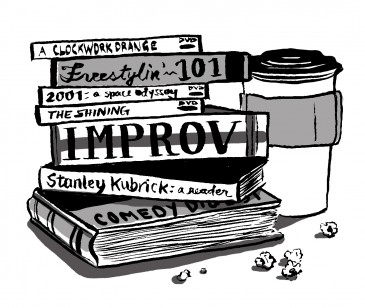CiTR Intern Sarah S. saw The Great Beauty and There Will Come A Day, while Arts Reporter Rohit tripped out on From Neurons to Nirvana and the Kill Team. Read their reviews below, and listen to Rohit’s on-air reviews from our October 9th show (this episode also includes Jonathan Kew’s reviews of Blue is the Warmest Color Oct 10 08:30 pm Vancouver Playhouse, La ultima pelicula and Vic + Flo Saw a Bear).
This Italian film from director Paolo Sorrentino follows Jep, a journalist living in Rome. The film starts with his 65th birthday party which is attended by the movers and shakers of Rome. During the party, Jep realizes he only ever had one hit novel, and has spent the rest of his life writing about the Jet Set; and so begins a sort of existential crisis. This movie has been compared to Oscar Winner La Dolce Vita; it was shot beautifully, the costumes were extravagant, and though it’s a cliche, it’s one of those movies that is a love story to it’s city. This film brought back fond memories of my time in Rome last year.
One of the big Canadian-made documentaries to come out of VIFF this year is British Columbian Oliver Hockenhull’s eye-opening and arguably mind-altering film From Neurons to Nirvana. This film takes a methodical approach in breaking down the societal taboos and controversy surrounding illicit psychedelic drugs. In doing so, Hockenhull has rallied an impressive and diverse panel of experts, who function as authoritative sources of information on enlightening scientific research regarding the medicinal value of illicit psychedelic drugs. Some of these revelations include the use of LSD (aka acid) as a potential cure for people suffering from alcoholism, and the utilization of MDMA for the treatment of war veterans who return from their combat experiences with Post-Traumatic Stress Disorder (PTSD). Given the right contexts and proper supervision, Hockenhull’s film asserts the powerful potential impact that these supposedly taboo psychedelic drugs can have on medical science.
The information in the film is presented with enough clarity that even a layman can understand the scientific concepts. However, the catch to the film’s informative nature is that much of the time we are having to experience the age-old problem of documentaries: in an over-indulgence of displaying ‘talking heads’ Hockenhull makes an attempt at mitigating this issue by interplaying the ‘talking head’ segments with surreal visualizations and dramatic yet ambient score, including the chanting of monks. The film has a clear structure and objective, but as Gabor Mate (one of the scientists who is interviewed in the film) mentioned in the Q&A after the screening, there is a sense that Hockenhull has created an “infomercial” in advocacy for psychedelic drugs.
Regardless, the insights and issues raised in Hockenhull’s film are extremely valuable. The time has come for the world’s leaders to have a mature conversation concerning the irrationality and fear mongering which corrupts the discussion of psychedelics. What Neurons to Nirvana may lack in technical execution, it more than makes up for in its delivery of a crucial message; that breaking free from the socially constructed shackles which plague our perception of psychedelic drugs may enable us to develop new forms of medical treatment, improving the lives for a significant portion of humanity.
Typically in North American mainstream news media, the U.S army’s war crimes are not discussed with much meaningful detail. Dan Krauss’ documentary titled The Kill Team attempts to push this topic in our faces, immersing the audience into every detail of the brutal and harsh realities that military intervention entails. This landmark documentary provides unprecedented levels of access to trial case of Adam Winfield; a U.S marine who blows the whistle on his squad’s malicious war crimes committed in Afghanistan. The result of Winfield’s actions end up with him being implicated in the war crimes he protested by his own squadmates so that he cannot speak out against them. When the deeds of Winfield’s squad finally becomes public knowledge, the painful process of military trial becomes the focus of the film, with all of its failures exposed.
In The Kill Team, Krauss intersperses disturbingly honest interviews from the perpetrators of war crimes with the heart breaking tale of the parents of Winfield. Video footage recorded by the soldiers as well as the gory photographs depicting their crimes are uncensored and utilized by Dan Krauss to their full extent. Despite the horrific nature of the crimes being depicted in this film, one must remember that these soldiers being interviewed were thrust into a paradoxical role of conducting a peacekeeping mission while having been trained for years to kill.
Inaction and even boredom are trotted out as some of the reasons that these young men in the U.S Marines would intentionally kill civilians, setting them up to look as if they were combat threats. Eventually, the rage I felt at hearing the sheer madness and immorality of Winfield’s comrades reached a more depressive stage where I realized, that even these war criminals are victims. In the same way that Adam Winfield’s father felt hopeless about his inability to do anything for his son, it is hopelessly naive for anyone to think that a young man trained to kill is somehow going to be an ideal peacekeeper in the ravaged environment of Afghanistan. As intense and depressing as this film can be, Krauss has crafted a purposeful narrative that flows with ease and hammers down the theme of war is hell in such a way that if you were completely desensitized to the daily news channel’s images, you will be shook up and awakened by the end of this film. I can say with the utmost certainty, that this is one of the most important documentaries I have watched in the last decade. – Rohit J.




